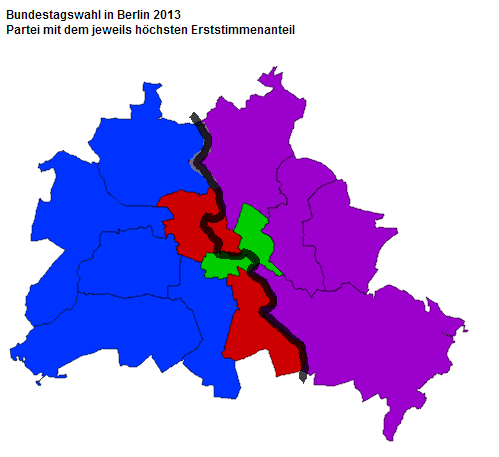Electoral divisions along the Berlin Wall
Last week's elections in Germany ended up more or less as expected. Angela Merkel's conservative CDU has won by a landslide (42%, only 5 seats short of a full Bundestag majority) ensuring her a third consecutive mandate as German Chancellor (an achievement only reached by two previous Chancellors - Konrad Adenauer and Helmut Kohl). Another expected result was the downfall of her main coalition partner, the liberal democrat FDP, which has fallen short of the 5% threshold to enter the Bundestag. This implies some post-electoral complications as a grand coalition between CDU and SPD (the social democrats) is inevitable. This was the governing coalition during Mekrel's first term as Chancellor and it was because of the coalition that the social democrats were punished in their subsequent elections. Just like what happened with the FDP in fact.
Anyway, with the victory Merkel has further strengthened her position as Europe's undisputed leader, which is undoubtedly good news for Europe, despite the one-sided austerity approach which has so far caused nothing but pain. This is hardly Merkel's fault as she is a strong advocate of structural reforms, which are still missing from all peripheral Eurozone countries. The political elites in these countries simply don't want to disrupt the cronies and interest groups keeping them in power. Anyway, at least now the uncertainty is gone and Europe can get back to Merkelism. Or some revised form of it in case of a grand coalition.
Anyway, with the victory Merkel has further strengthened her position as Europe's undisputed leader, which is undoubtedly good news for Europe, despite the one-sided austerity approach which has so far caused nothing but pain. This is hardly Merkel's fault as she is a strong advocate of structural reforms, which are still missing from all peripheral Eurozone countries. The political elites in these countries simply don't want to disrupt the cronies and interest groups keeping them in power. Anyway, at least now the uncertainty is gone and Europe can get back to Merkelism. Or some revised form of it in case of a grand coalition.
The most interesting result that came out of the German elections has occurred in Berlin. FT's Alphaville has the chart of Berlin's constituencies and the majority winners in each of them. What is strikingly obvious is the divide between the two parts of Berlin - East voting for Die Linke (The Left), a successor of the former Socialist Party that ruled East Germany, and the only party no one wants to go into coalition with, while the Western part of Berlin voting for conservative CDU. The SPD and the Greens were strongest on the border.
 |
| Source: Berlin's electoral supervisor (in German). |
Does this imply that the unification process is still not finished? Possibly, as it takes a lot of time for informal institutions (customs, norms, culture, preferences) to adapt to institutional change. But stark regional differences still exists. The gap was decreased in the past 20 years mainly thanks to large fiscal transfers, but the East still lags the West in levels of income, unemployment and the amount of wealth. One could say that East Germany is still coping with its pains of transition, just like the rest of Eastern Europe. Different electoral result confirm this. The Eastern part is more prone to protests and in times of crisis are more likely to invoke the old regime. This also explains why the Alternative for Deutschland (AfD), an anti-Europe party, did much better in Eastern parts of the country. The people like to jump from one extreme to another. This is true for most post-communist countries and it's true for East Germany as well. It will take a generational switch to change such voter preferences in these areas. But in the mean time, stark ideological differences will still be present, and in some countries dominant.




While we are focusing on fear, worry, or hate, it is not possible for us to be experiencing happiness, enthusiasm or love. Bo Bennett
ReplyDelete